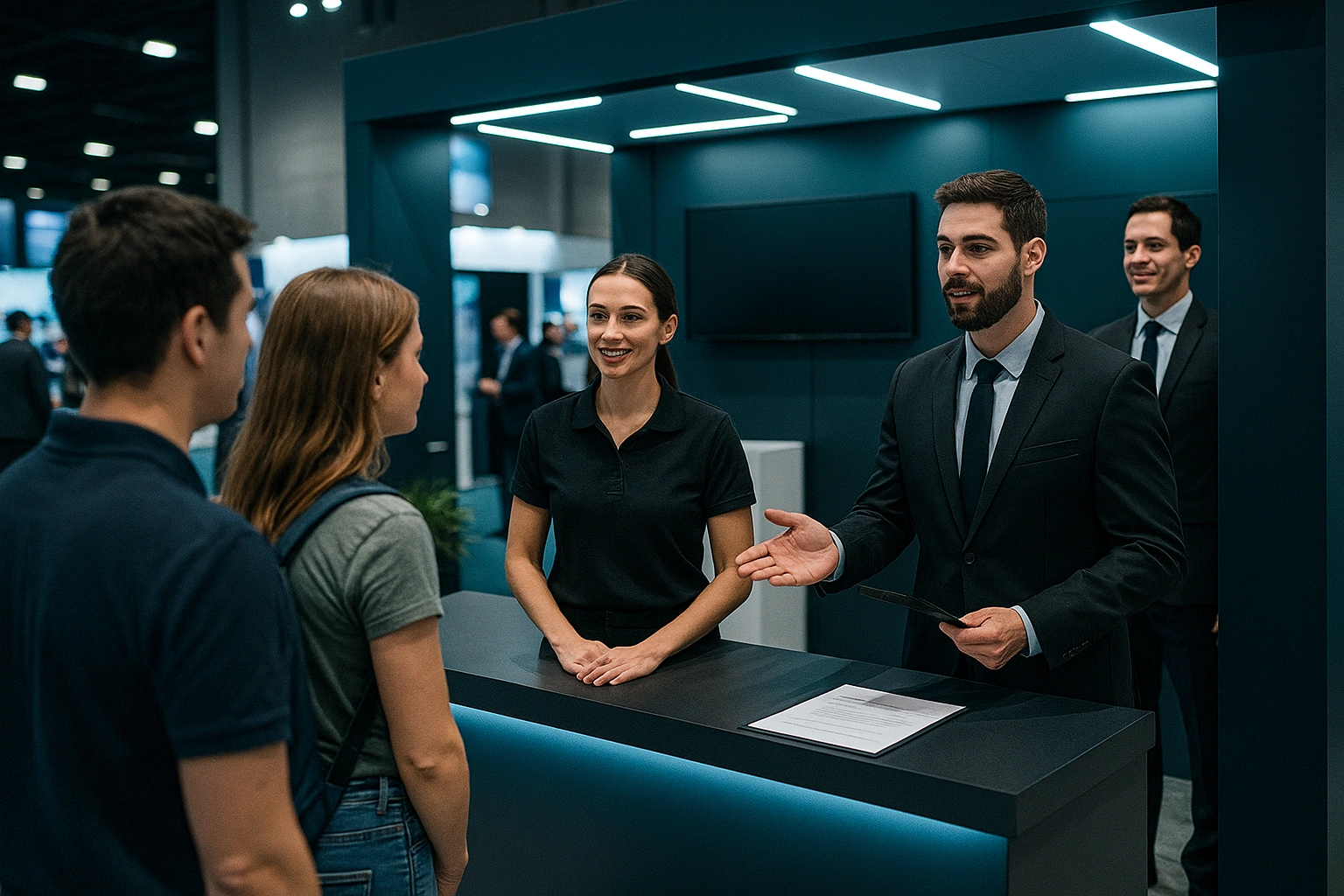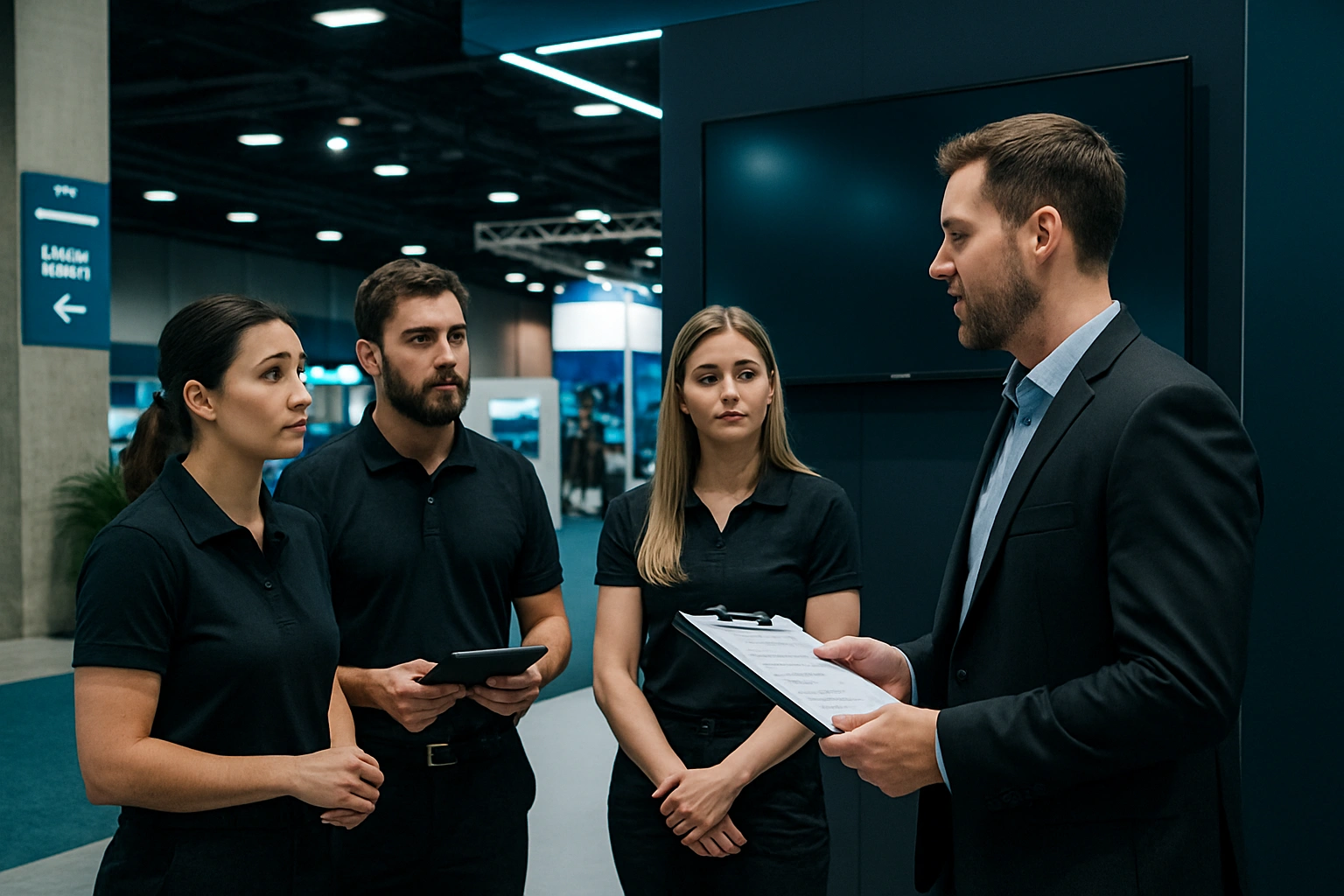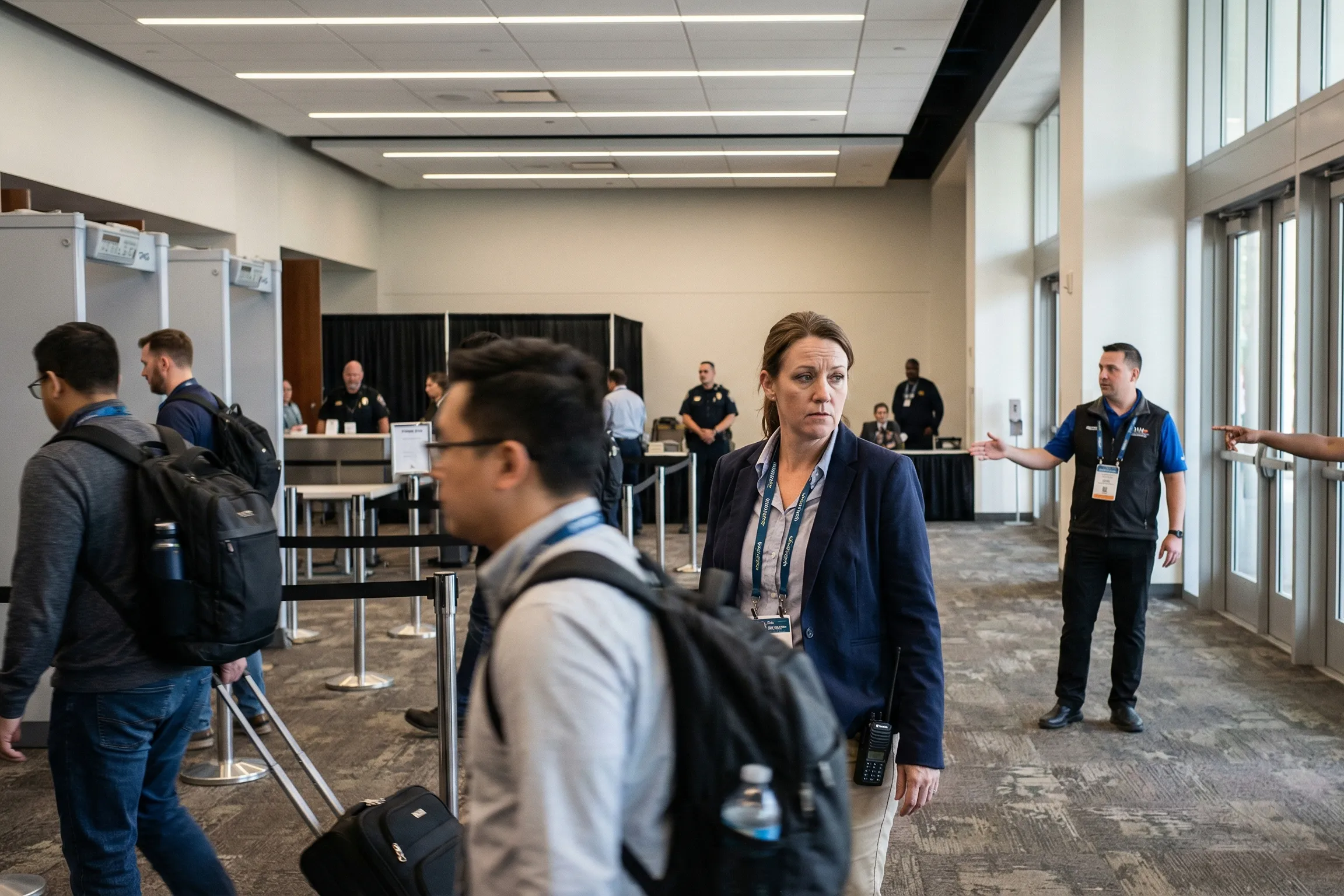When Risk Overshadows Design at Modern Trade Shows
In today’s high-stakes expos, risk management has become the real competition. Booth design and brand storytelling still turn heads, but compliance, crowd flow, and data handling determine whether a company walks away with results or repercussions. One unchecked hazard, one untrained hire, or one broken protocol can unravel a multimillion-dollar appearance.
That is why brands no longer view trade show booth staff as temporary hires. They are operational guardians trained to spot and solve problems before clients even know they exist. Whether coordinating with venue inspectors, managing lead capture, or de-escalating crowd issues, professional event booth staff convert unpredictable environments into controlled experiences.
At Event Staff, we see risk differently. Our teams are briefed for every venue’s rules, every brand’s tone, and every emergency scenario. The goal is not only flawless execution but also protection of reputations, assets, and guest safety while keeping the booth open, inviting, and compliant from start to finish.
CEO Excerpt
“At every major expo, success depends on control of process, compliance, and presentation. Our trade show booth staff are trained to represent brands while protecting them. They execute with precision and ensure every activation meets operational, regulatory, and reputational standards. That is how Event Staff defines professionalism.”
— CEO, Event Staff

Why Risk Reduction Defines Expo Success
The modern trade show is a high-density environment with complex moving parts: overlapping vendor schedules, live electrical setups, guest traffic control, and constant data exchange. Every booth is essentially a temporary operation center subject to labor laws, fire codes, and insurance clauses. That complexity means even minor oversights can lead to major costs.
Research by the Center for Exhibition Industry Research shows that more than half of large exhibitors experience at least one on-site compliance issue during multi-day events. These incidents range from late safety inspections to unqualified temporary staff handling visitor registration. Each case risks not only fines but also reputational damage that can ripple across digital channels long after the event ends.
Risk management, therefore, is no longer a support function. It is a central pillar of brand experience delivery. Companies that treat staffing as part of their compliance infrastructure perform more consistently across events, maintain stronger relationships with venues, and protect their return on investment. Event Staff specializes in this kind of reliability, supplying trained teams who understand both the excitement of a live event and the discipline of regulatory precision.

5 Ways Professional Booth Staff Reduce Risk
Each major risk category at expos can be traced back to people, process, or coordination. Skilled personnel close those gaps. Below are five areas where trained trade show booth staff prevent disruptions and protect client brands, along with how Event Staff operationalizes each safeguard.
1. Ensuring Regulatory and Venue Compliance
Every venue enforces its own mix of safety and access rules, and non-compliance can stop a booth build before it starts. From electrical setups to badge clearances, regulatory precision begins with the team on-site. Well-trained event booth staff understand load-in zones, emergency egress paths, and insurance verification routines.
How Event Staff integrates this safeguard:
Each deployment begins with a location-specific compliance briefing led by a city operations manager. Staff are trained to identify restricted areas, verify proper signage, and maintain open exits during heavy traffic periods. Supervisors conduct mid-day checks to confirm that fire-safety and equipment spacing requirements remain valid throughout the show. The result is a setup that satisfies both inspectors and clients, avoiding penalties and last-minute redesigns.
2. Safeguarding Brand Reputation Through Professional Conduct
The quality of booth interactions directly shapes public perception. Untrained or unvetted temporary staff can derail that impression within seconds through inconsistent behavior or unprofessional presentation. In contrast, experienced booth staff act as brand stewards who maintain poise, precision, and situational awareness under pressure.
How Event Staff integrates this safeguard:
Every staff member undergoes a screening and uniforming protocol before assignment. They are briefed on client tone, product sensitivity, and brand voice to ensure consistent delivery across shifts. Supervisors monitor booth etiquette, manage rotations, and address any deviation from conduct standards in real time. This professionalism not only protects the exhibitor’s reputation but also enhances visitor engagement, making the booth feel organized and credible even during peak hours.
3. Securing Lead and Data Capture
At trade shows, every visitor interaction generates valuable information such as names, job titles, and purchase-intent data. Yet many companies underestimate how easily these details can be mishandled. Using unsecured devices or handwritten lists exposes brands to data loss or privacy violations under laws such as GDPR and CCPA.
How Event Staff integrates this safeguard:
Event Staff trains all temporary experiential staff in compliant lead-collection methods. Every team uses encrypted tablets or verified client applications with controlled access settings. Supervisors monitor data handoff protocols at shift changes, ensuring no personal information remains exposed on shared devices. Staff are also instructed never to store visitor data outside approved systems. This disciplined process keeps exhibitors compliant, protecting both attendee trust and post-show ROI.
4. Stabilizing Booth Operations Under Peak Pressure
Expos often experience unpredictable attendance surges, speaker crossovers, and unscheduled press visits. When booth traffic doubles without warning, operations can falter if staffing levels or communication systems are weak. A single delayed rotation or unmonitored queue can affect hundreds of interactions and cause missed sales opportunities.
How Event Staff integrates this safeguard:
The company’s proprietary scheduling platform connects all on-site supervisors through real-time alerts and shift dashboards. Backup personnel remain on reserve for quick deployment if lines extend beyond target thresholds. Crew leaders adjust rotations based on visitor flow and nearby event timing, keeping staffing density proportional to activity. This approach stabilizes operations while maintaining service consistency, ensuring that every attendee is greeted promptly and every interaction meets brand standards.
5. Coordinating Cross-Vendor Communication
Large expos involve multiple vendors including audiovisual, security, catering, and logistics teams all working within tight timeframes. Without structured communication, one misaligned schedule can delay setup or disrupt live presentations. Effective coordination depends on staff who understand both event hierarchies and venue protocols.
How Event Staff integrates this safeguard:
Before every event, Event Staff assigns a lead liaison who joins the client’s vendor briefing call. This person translates scheduling and access instructions into clear, executable checklists for booth teams. On-site, leads maintain contact with facility managers and security to handle unexpected adjustments such as power checks or floor changes. This structured communication chain minimizes downtime and ensures that every participating vendor stays aligned with booth priorities.

How Event Staff Embeds Risk Management in Every Expo Operation
Risk prevention at expos is not a single checklist. It is an operational discipline. Event Staff’s national model builds that discipline into every layer of deployment, from recruitment to debrief.
- Training and Certification: Every staff member completes safety and compliance training before entering the field. Modules include OSHA awareness, data security, and emergency procedures.
- Supervision and Oversight: Tiered supervision ensures that field leads report to city-level managers who monitor performance metrics and incident logs daily.
- Technology Integration: Scheduling software tracks attendance, shift compliance, and client feedback in real time. This data informs rapid response if replacements or adjustments are needed.
- Pre-Event Compliance Checks: Operations managers review fire-code maps, labor documentation, and insurance requirements for every booth build.
- Post-Event Auditing: Each deployment ends with a structured debrief identifying lessons and compliance outcomes, which feed directly into future staff briefings.
These layers make Event Staff’s trade show teams both proactive and accountable. The result is a risk-controlled environment where exhibitors can focus on visibility and engagement while knowing that compliance, coordination, and conduct are being managed by professionals.
Local Insight: Risk Management Across Major Expo Hubs
Every major expo market in the United States carries its own set of risk variables. A plan that works flawlessly in Orlando may not meet inspection requirements in Chicago or New York City. Understanding these local nuances is what separates a capable staffing agency from a national operations partner.
Las Vegas: The city’s convention centers operate under union and contractor coordination rules that can halt setup if labor protocols are breached. Event Staff’s Las Vegas crews are briefed on work-hour regulations, dock access timing, and union liaisons, ensuring uninterrupted load-ins at venues such as the Las Vegas Convention Center and Mandalay Bay.
Orlando: Florida’s weather patterns introduce contingency risks that can affect outdoor exhibits and transport schedules. Event Staff teams monitor real-time forecasts and maintain backup logistics plans for sudden rain or heat advisories, protecting both staff welfare and equipment safety.
New York City: Fire-marshal inspections and security access points at venues like the Javits Center are notoriously strict. Event Staff field leads maintain inspection-ready layouts and coordinate closely with facility officers to keep traffic and egress routes clear throughout show hours.
Chicago: At McCormick Place, overlapping vendor operations and heavy-equipment corridors can disrupt booth timelines. Event Staff’s supervisors liaise directly with floor managers to sequence deliveries and manage high-traffic transition periods, keeping activation areas compliant and accessible.
Nationwide Reach: Event Staff delivers this same precision across 21 U.S. cities, supporting expos in markets of every scale from regional conventions to global trade showcases. Our nationwide network allows clients to expect identical training standards, compliance accuracy, and supervision quality whether the event is in Seattle, Charlotte, or Miami. That breadth of coverage gives brands consistent performance and peace of mind in any market they choose to exhibit.
Bottom Line
Risk control is now an inseparable part of trade show success. The difference between a flawless activation and a costly disruption often comes down to the quality and training of your booth personnel. Event Staff provides the structure, supervision, and discipline that national exhibitors depend on. From compliance checks to crowd flow management, every team member contributes to operational safety and brand credibility.
When the next expo demands precision under pressure, trust the team that delivers consistent, compliant, and professional staffing across 21 U.S. cities. Book trained trade show booth staff through Event Staff and protect your brand at every show floor.





